Daily Vocabulary Words: List of Daily Used Words in Leading Indian Newspapers
Hi there. Welcome to this special section @ Wordpandit. Our endeavour here is straightforward: highlighting daily vocabulary words that you would come across in leading newspapers in the country. We have included the following newspapers in our selection:
• The Times of India
• The Economic Times
• Hindustan Times
• Mint
• Indian Express
We are putting in extensive work to develop your vocabulary. All you have to do is be regular with this section and check out this post daily. This is your repository of commonly used words; essentially, we are posting a list of daily used words. Hence, this has significant practical application as it teaches you words that are commonly used in leading publications mentioned above.
Visit the website daily to learn words from leading Indian newspapers.
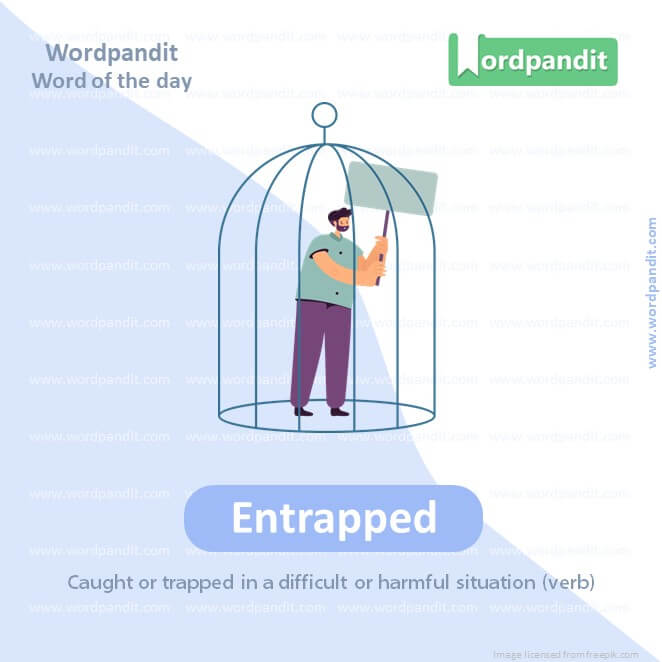
WORD-1: Entrapped
CONTEXT: The Kerala Story is allegedly based on the “true” stories of Malayali girls who were systematically brainwashed and entrapped by a section of Muslims, converted to Islam and turned into “terrorists” for use by the Islamic State in West Asia.
SOURCE: Indian Express
EXPLANATORY PARAGRAPH: Imagine playing a game of hide-and-seek, and you accidentally get stuck in a place where you can’t get out easily. That’s like being “entrapped” – stuck in a situation that’s hard to escape.
MEANING: Caught or trapped in a difficult or harmful situation (verb).
PRONUNCIATION: en-TRAPT
SYNONYMS: ensnared, trapped, caught, confined, imprisoned
USAGE EXAMPLE:
1. The mouse was entrapped in the maze and couldn’t find its way out.
2. She felt entrapped in her job with no room for growth.
3. The detective’s plan was to entrapped the thief by setting up a fake deal.
4. He realized he was entrapped in a cycle of bad habits.
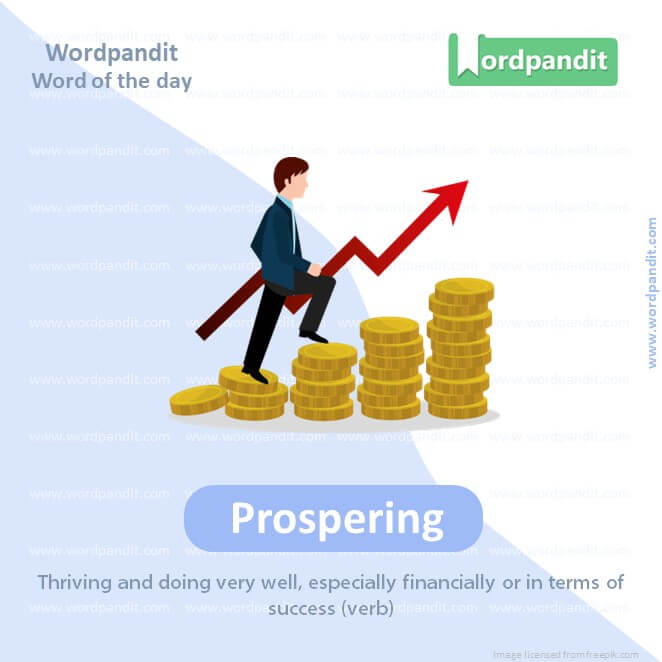
WORD-2: Prospering
CONTEXT: The Kerala Story confirms and feeds the demographic anxieties of certain sections of Kerala society, that one community is growing and prospering at the expense of others.
SOURCE: Indian Express
EXPLANATORY PARAGRAPH: When a plant gets plenty of sunlight, water, and nutrients, it grows big and healthy. That’s what it means to be “prospering” – doing really well and growing in a good way.
MEANING: Thriving and doing very well, especially financially or in terms of success (verb).
PRONUNCIATION: PRAHS-per-ing
SYNONYMS: flourishing, thriving, successful, booming, advancing
USAGE EXAMPLE:
1. The business started prospering after they introduced new products.
2. She worked hard in school and was prospering academically.
3. Despite challenges, the town’s economy is prospering due to tourism.
4. The garden is prospering with all the rain we’ve been getting.
WORD-3: Scrabble
CONTEXT: Never mind that “love jihad” has, time and again, been proved to be a mere bogey, drummed up by conservative forces as they scrabble to find their footing in a society that is rapidly changing — for such forces, controlling the lives and bodies of young people, especially women, is the first response to what seems like an existential threat.
SOURCE: Indian Express
EXPLANATORY PARAGRAPH: Have you played a word game where you have to create words from letter tiles? That’s called “Scrabble.” It’s a fun game where you make words using letters and score points.
MEANING: A word game where players use letter tiles to create words and earn points (noun).
PRONUNCIATION: SKRAB-uhl
SYNONYMS: word game, crossword, puzzle
USAGE EXAMPLE:
1. We play Scrabble every Sunday with our family.
2. She’s really good at Scrabble and often wins against her friends.
3. Scrabble is a great way to improve your vocabulary while having fun.
4. They had a Scrabble tournament at the community center last week.
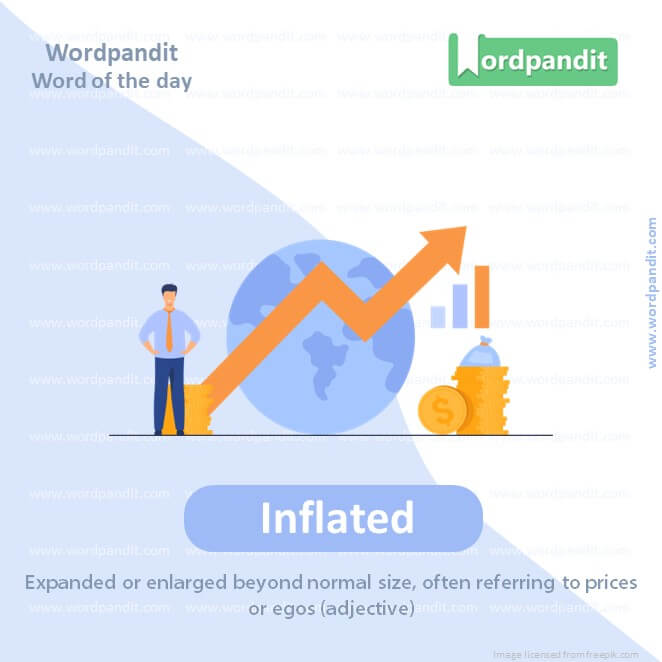
WORD-4: Inflated
CONTEXT: Never mind also that the makers of The Kerala Story had to backtrack on the inflated claims they had made, about their film telling the truth about what had happened to “32,000 girls” in the state after they were taken to court
SOURCE: Indian Express
EXPLANATORY PARAGRAPH: Imagine blowing up a balloon until it becomes really big and puffy. That’s what “inflated” means – something that has been filled with air or expanded more than usual.
MEANING: Expanded or enlarged beyond normal size, often referring to prices or egos (adjective).
PRONUNCIATION: in-FLAY-ted
SYNONYMS: expanded, enlarged, swollen, bloated, exaggerated
USAGE EXAMPLE:
1. The prices of goods were inflated during the holiday season.
2. His ego became inflated after receiving praise from everyone.
3. The company’s claims about their product were found to be inflated.
4. Inflated balloons decorated the party venue.
WORD-5: Moralise
CONTEXT: The films mentioned earlier in this article — Sudani From Nigeria (2018), Angamaly Diaries (2017) and Kumbalangi Nights (2019) — all depict a Kerala that is comfortable enough with its diversity that it can, quite naturally, tell stories of and from all its communities, without feeling the need to moralise about it or resorting to tokenism.
SOURCE: Indian Express
EXPLANATORY PARAGRAPH: When someone tells you what is right and wrong in a very serious way, almost like giving you a lesson, that’s called “moralise.” It’s like teaching you about good behavior and values.
MEANING: To preach or teach moral lessons, especially in a self-righteous or tedious way (verb).
PRONUNCIATION: MOR-uh-lize
SYNONYMS: preach, lecture, sermonize, pontificate, admonish
USAGE EXAMPLE:
1. The teacher moralised about honesty during the class discussion.
2. He tends to moralise about healthy eating whenever we go out to eat.
3. The book’s main character often moralises about the importance of kindness.
4. Don’t just moralise; try to understand other perspectives as well.
WORD-6: Reaping
CONTEXT: Through investments in the care economy, Japan is reaping benefits of bringing more women into the workforce.
SOURCE: Indian Express
EXPLANATORY PARAGRAPH: Remember planting seeds in the garden? When those seeds grow into plants and produce fruits or vegetables, that’s called “reaping.” It’s like collecting the rewards of your hard work.
MEANING: Gathering or harvesting something, especially the benefits of previous actions or efforts (verb).
PRONUNCIATION: REE-ping
SYNONYMS: harvesting, collecting, gathering, obtaining, earning
USAGE EXAMPLE:
1. After years of studying, she’s now reaping the rewards with a successful career.
2. The team’s hard work is finally reaping results on the field.
3. The business invested in new technology and is now reaping the benefits.
4. It takes patience and dedication to reap the benefits of exercise.
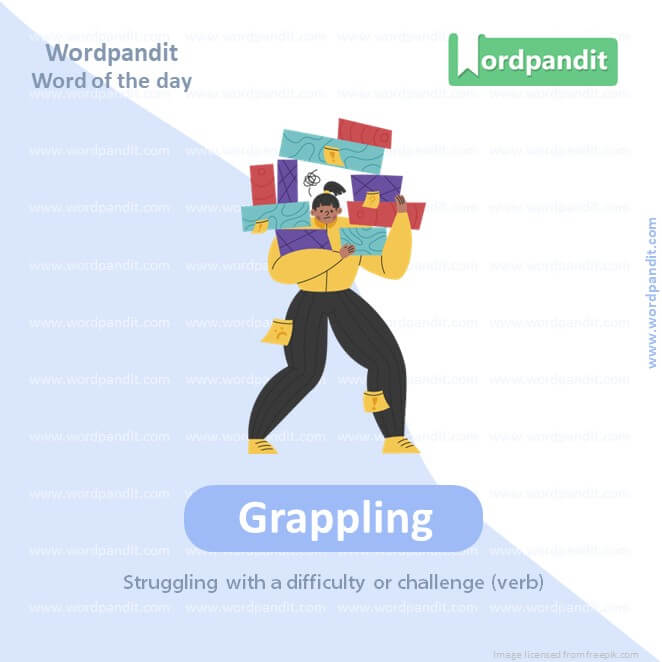
WORD-7: Grappling
CONTEXT: Even as Japan was grappling with falling fertility rates, a declining population, and stagnant growth, a series of reforms on “womenomics” were introduced as part of the “Abenomics” era.
SOURCE: Indian Express
EXPLANATORY PARAGRAPH: Imagine trying to hold onto something very tightly, like trying to catch a ball before it falls. That’s what “grappling” is – trying hard to deal with a difficult situation or problem.
MEANING: Struggling with a difficulty or challenge (verb).
PRONUNCIATION: GRAP-ling
SYNONYMS: struggling, wrestling, contending, coping, tackling
USAGE EXAMPLE:
1. The country is grappling with economic issues after the recession.
2. He’s grappling with the decision of whether to study abroad or stay home.
3. The team is grappling with injuries but remains determined to win.
4. Grappling with difficult concepts is part of learning new things.
WORD-8: Paternity
CONTEXT: Japanese parents had been entitled to year-long partially paid parental leaves — with women receiving 58 weeks, and men 52 weeks. In 2022, greater flexibility in paternity leave provisions was introduced, reducing notice periods, and allowing men to break up their paternity leave.
SOURCE: Indian Express
EXPLANATORY PARAGRAPH: When a baby is born, people often talk about who the father is. That’s what “paternity” means – it’s about the relationship between a father and his child.
MEANING: The state of being a father or the identity of one’s father (noun).
PRONUNCIATION: puh-TER-ni-tee
SYNONYMS: fatherhood, parentage, paternality, siring
USAGE EXAMPLE:
1. The paternity of the child was confirmed through a DNA test.
2. He took on paternity leave to spend more time with his newborn.
3. The paternity of the famous writer was a topic of much speculation.
4. He denied paternity until the DNA results proved otherwise.
WORD-9: Entitlement
CONTEXT: As is evident from the Japanese experience, legal entitlement to gender-neutral parental leave is not sufficient.
SOURCE: Indian Express
EXPLANATORY PARAGRAPH: Imagine if you always expect to get something without working for it, like getting a toy every time you go to the store. That’s what “entitlement” is – feeling like you deserve things even if you haven’t earned them.
MEANING: The belief or feeling that one is deserving of certain privileges or benefits without having earned them (noun).
PRONUNCIATION: en-TAHYT-l-muhnt
SYNONYMS: privilege, right, claim, prerogative, birthright
USAGE EXAMPLE:
1. Some people have an entitlement mentality, expecting things without effort.
2. The company offers benefits to employees as part of their entitlements.
3. The entitlement of the wealthy often leads to inequalities in society.
4. Teaching children about gratitude helps counteract feelings of entitlement.
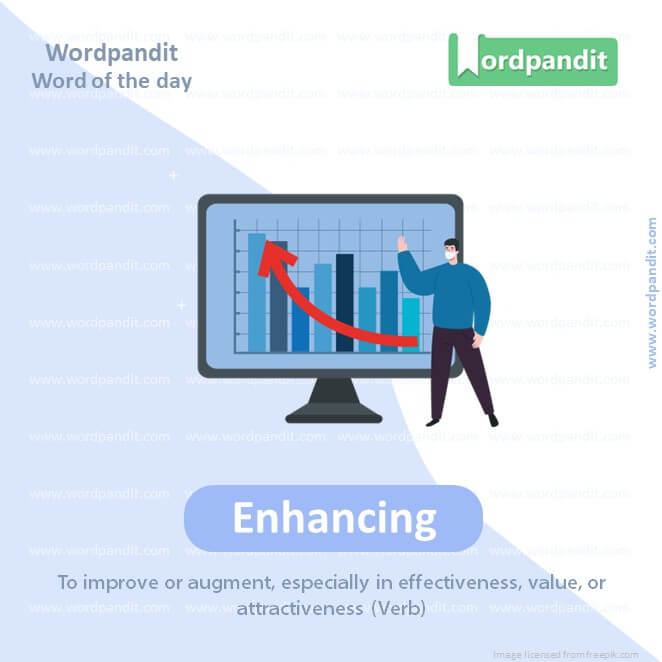
WORD-10: Enhancing
CONTEXT: Enhancing uptake among men requires an employer-led approach that dispels gender stereotypes around care work.
SOURCE: Indian Express
EXPLANATORY PARAGRAPH: When you add something special to make things better, like adding chocolate chips to cookies to make them tastier, that’s called “enhancing.” It’s about improving or making something more attractive.
MEANING: To improve or augment, especially in effectiveness, value, or attractiveness (Verb).
PRONUNCIATION: en-HANS-ing
SYNONYMS: improving, boosting, upgrading, refining, enriching
USAGE EXAMPLE:
1. The new software update is aimed at enhancing user experience.
2. Adding fresh herbs can enhance the flavor of a dish.
3. They used special lighting to enhance the beauty of the artwork.
4. Education is key to enhancing opportunities for future success.
Vocabulary Daily Use
In the fascinating world of language learning, we often concentrate on taking giant leaps, but the real magic lies in the small steps of ‘vocabulary daily use’. These frequently used words and phrases form the backbone of practical communication and understanding. Therefore, mastering ‘vocabulary daily use’ is a crucial element in achieving language fluency.
To effectively learn ‘vocabulary daily use’, one needs to venture beyond the traditional textbook resources. The real essence of these words unveils itself in everyday exposure and interactions. Engaging with a variety of material like novels, magazines, newspapers, podcasts, films and digital content deepens the understanding of ‘vocabulary daily use’. Immersion in these contexts yield natural, everyday language that bridges the gap between the classroom and the real world.
The journey of mastering ‘vocabulary daily use’ necessitates the integration of innovative memory techniques. Flashcards and the Leitner System aid in embedding these words into your long-term memory by promoting active recall. Additionally, the use of mnemonic devices, which allow you to associate ‘vocabulary daily use’ with personal and familiar narratives, can enhance your ability to remember and recall these words.
Moreover, it’s important to remember that ‘vocabulary daily use’ isn’t just about comprehension- it’s about practice and active usage. Incorporate these words in your day-to-day communication and social interactions. This not only solidifies your understanding but also accelerates learning and internalization of ‘vocabulary daily use’.
In a nutshell, mastering ‘vocabulary daily use’ is a continual process that demands exposure, creative learning strategies and assertive practice. The commingling of these tactics brews the perfect formula that allows learners to seamlessly integrate ‘vocabulary daily use’ into their linguistic repertoire. And with that, they can navigate the nuances of language with confidence and ease.













